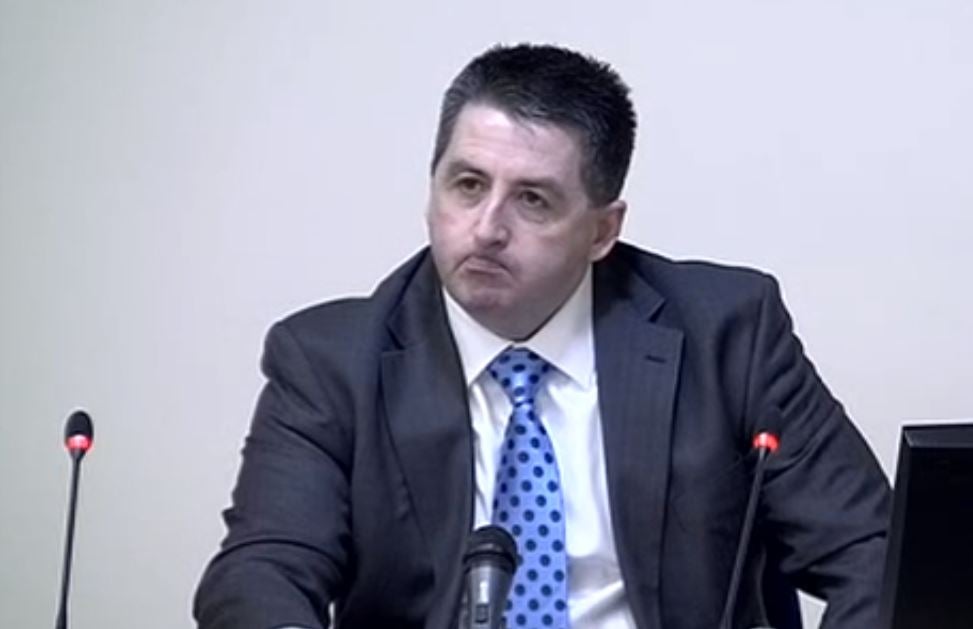
A former intelligence officer whose computer was hacked has accepted substantial undisclosed damages from News Group Newspapers.
Ian Hurst brought proceedings at London’s High Court against NGN, publisher of the defunct News of the World, and News UK & Ireland (formerly News International Supply Company) for breach of confidence and misuse of private information.
Hurst (pictured above giving evidence to the Leveson Inquiry) served in the Intelligence Corps and the Force Research Unit in Northern Ireland between 1980 and 1991 when he retired.
His primary role was to recruit and run agents within Republican terrorist groups in order to obtain tactical and strategic intelligence.
Hurst’s counsel, Jeremy Reed, told Mr Justice Mann on Friday that NGN now accepted that Hurst’s privacy had been invaded.
He said that it accepted vicarious liability for the circumstances which ultimately led to the wrongful acts of Philip Campbell Smith, who was known to some for his expertise in computer hacking and email interception.
He added that NGN recognised it would be impossible to determine the full extent of the wrongdoing directed at Hurst and his family, but it acknowledged that, at the very least, his emails were intercepted routinely and intensively over a period of several months during 2006.
It had agreed to pay him substantial damages and his legal costs.
It has previously been alleged that the computer hacking was linked to the News of the World.
Anthony Hudson QC, for NGN, said it offered its “sincerest and unreserved” apologies.
“News Group Newspapers accepts that such activity happened, accepts that it should never have happened, and has undertaken to the court that it will never happen again.
“Indeed, News Group Newspapers took steps several years ago to ensure that nothing like this could happen again.”
Reed said the reason why Mr Hurst was initially targeted is likely to have been because a then, but now former, employee of News Group Newspapers Limited wished to locate the whereabouts of Freddie Scapaticci, the former head of the IRA Security Division.
Hurst had named Scapaticci in a book he co-authored as being an agent of the British government with the codename “Stakeknife”.
He added that Hurst regularly engaged in sensitive and confidential and in some cases, privileged, correspondence by email with a variety of people.
These included his solicitors at the time, members of the Irish republican movement, people within the security services, members of the Police Service of Northern Ireland, and former members of the Armed Forces who had infiltrated the IRA – including individuals in the police witness protection programme, resulting from their inclusion near the top of the Real IRA’s hitlist.
Hurst was entirely unaware of Smith’s activities until 2011 when he was contacted by BBC Panorama. An investigation was then launched by the Metropolitan Police.
Reed said: “After the initial shock of being informed that he was a victim of computer hacking and email interception, Mr Hurst became increasingly shocked and appalled as he began to discover the extent of the unlawful activity against him.
“He was horrified to see copies of actual emails which had been intercepted and genuinely feared for the safety of many of the people with whom he had been in contact.
“Mr Hurst was and remains embarrassed that someone was able to access his computers in this manner and that the trust which others have placed in him has been jeopardised and degraded as a result.
“Mr Hurst is also furious that his personal correspondence and private family information has been invaded in this way. He feels completely violated and humiliated.
“Likewise, his wife and daughter were most distressed to learn the facts of this matter. They are both particularly upset that their privacy has been invaded in this manner.”
Email pged@pressgazette.co.uk to point out mistakes, provide story tips or send in a letter for publication on our "Letters Page" blog
